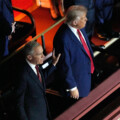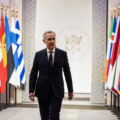As the Trump administration challenges long-standing conservative economic orthodoxy on free markets and free trade, its ideas were bound to find curious students on the Canadian Right. One of its most prominent thus far is former Conservative MP Ryan Williams.
During his term in parliament, Williams, the party’s critic for industry, science and innovation, nodded to heterodox ideas on competition and technology policy. Since April’s election, he’s continued to engage with contemporary political economy issues, including recent Substack essays on “digital sovereignty” and “fixing free trade.”
These commentaries have, in broad terms, displayed an interest in free trade skepticism, greater comfort with state-led economic policy, and generally less deference to the economic liberalism that’s defined conservative economic orthodoxy in the post-Cold War era.
They’re interesting and notable as exercises in intellectual inquiry in an age of heterodoxy. But as the basis for Conservative (and conservative) economic policymaking, they’re ultimately wrongheaded. They underestimate the achievements of post-Cold War neoliberalism and overestimate the promise of post-neoliberal alternatives.
Williams may not quite be a post-neoliberal himself. But his latest essay on free trade and globalization in particular reflects a growing curiosity about ideas that depart from the Mulroney-Harper model of open markets, liberalized trade, and limited government. Although he invokes Ricardian logic (“Produce what we do best. Trade for the rest.”), he also calls for “good trade,” “smart economics,” “protecting key industries,” and using the state to insulate and nurture Canadian ownership in technology sectors.
The essay in short reads as a paradox. On the surface, Williams insists that he wants to “fix” free trade rather than “kill” it. Yet underneath his free-market language are ideas that would amount to a backdoor endorsement of post-neoliberal economic nationalism. He seems to be signaling in favour of an economic model that privileges domestic firms and industries, uses the state as a shield, and reinterprets market outcomes as something to shape rather than enable.
To understand why this tension matters, it’s worth recalling the legacy that Williams is moving away from. Canadian Conservatives (and conservatives) weren’t merely passive participants in the liberalization of the global economy. They were central architects of it.
Brian Mulroney’s government broke a century of hesitation and signed the 1989 Canada-U.S. Free Trade Agreement and then later the North American Free Trade Agreement with the U.S. and Mexico. These agreements were in hindsight key to ushering in the subsequent four decades of free trade and globalization.
Yet the neoliberal era was about more than trade deals. It involved economic liberalization (including domestic deregulation and privatization), lower taxes, spending cuts and deficit reduction, and the steady yet incomplete dismantling of barriers that prevented Canadians from selling goods, services, and ideas to the world.









